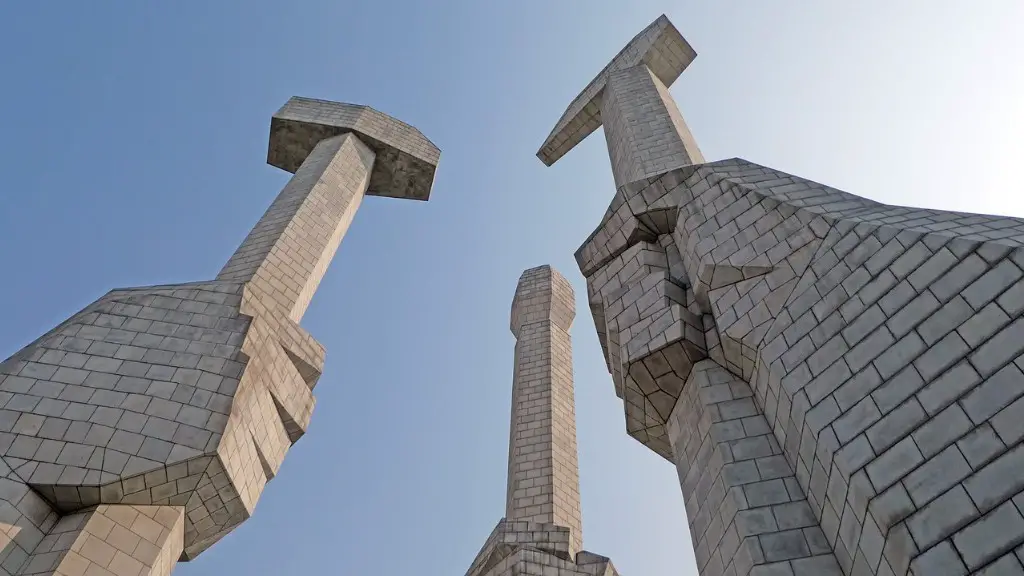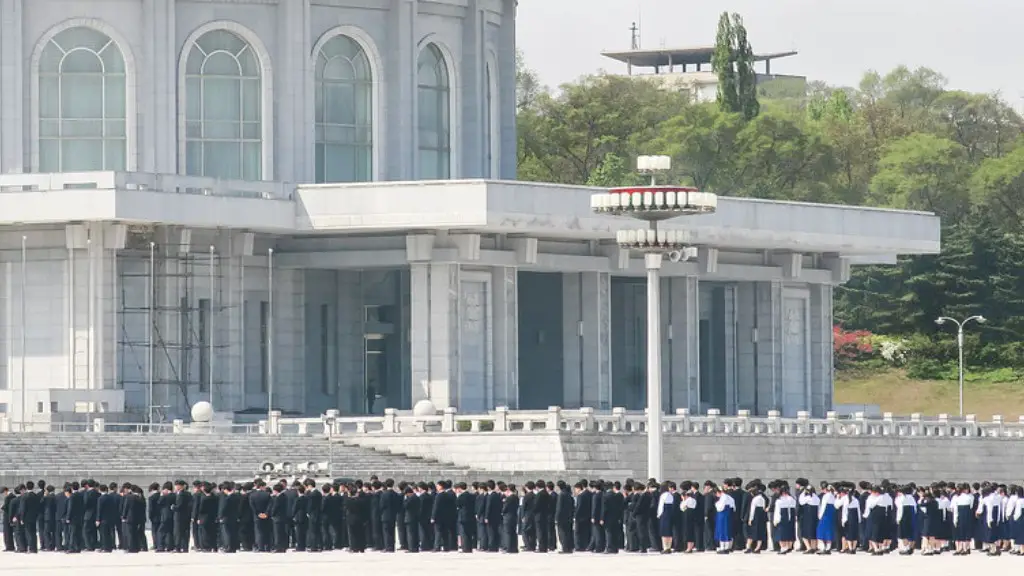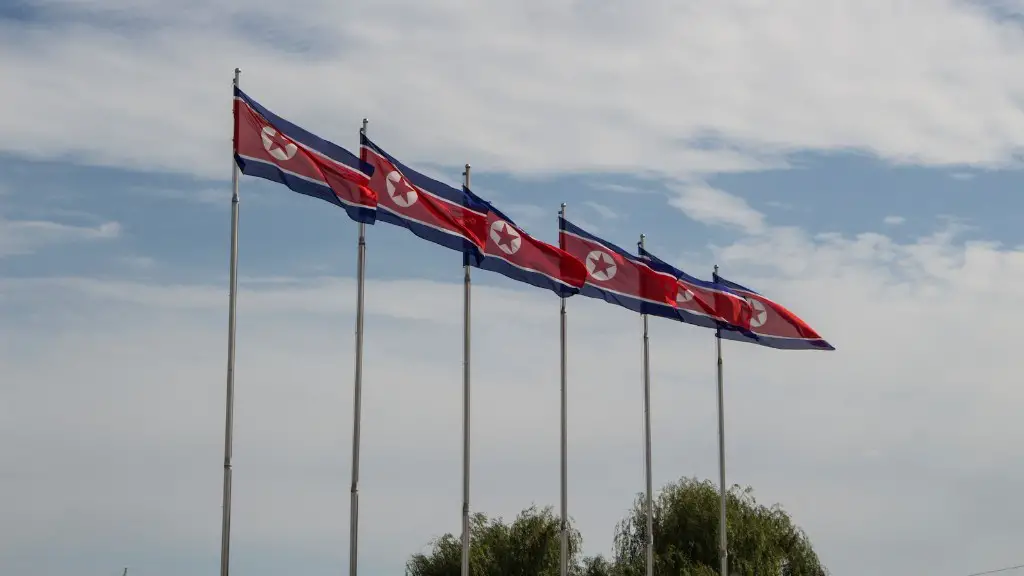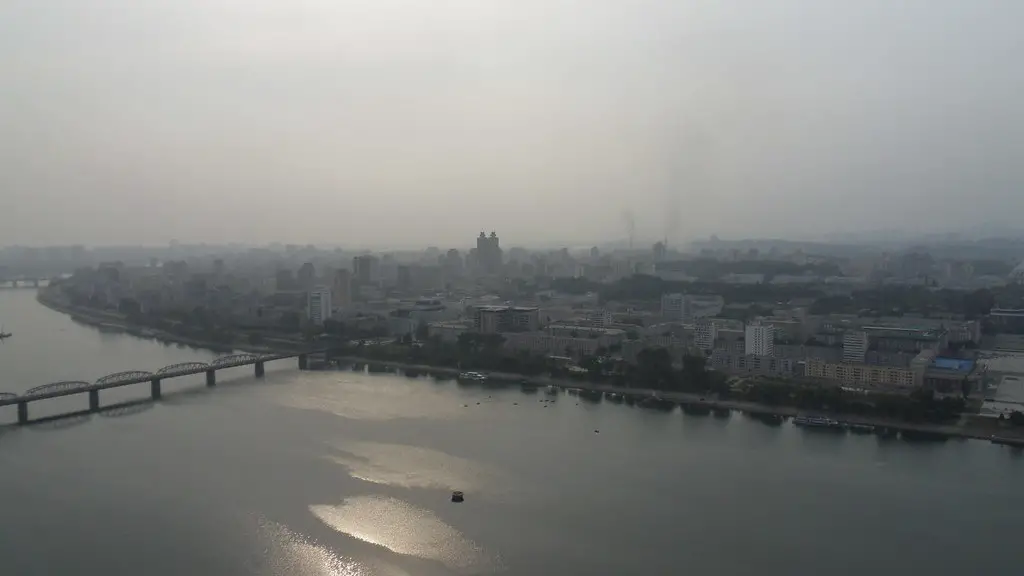Missiles and the means to fire them are some of the most powerful weapons in the world, and the subject of many debates and negotiations, some decades long. North Korea has raised more than a few eyebrows with its acquisition of missiles and its continued nuclear ambitions, leaving many to ask: where does North Korea get its missiles?
The answer can be found in the nation’s geography, culture, and history. North Korea borders China, Russia, and South Korea – all of whom have access to technology and production capabilities, or who have the means of trading for them from other nations. By leveraging this access and its own resources, North Korea has managed to develop an arsenal of missiles, which have been showcased and tested with much fanfare in recent years.
At the core of North Korea’s missile capabilities are indigenously designed and manufactured short-range, medium-range, and long-range rockets. This system is believed to have been a slow build, beginning in the post-World War II period, when Soviet and Chinese aid enabled the North Korean government to set up rudimentary research and development facilities to produce rockets and missiles. As the Cold War largely supplanted the former international alliance system, North Korea’s research and development capabilities expanded, resulting in the development of longer range rockets and missiles.
Under the rule of Kim Il-Sung and Kim Jong-Il, North Korea’s access to foreign missile technology and assistance only increased, particularly from Russia. North Korean engineers benefited from Russian advisors who, over time, provided not only technical assistance but also the means to launch and operate missiles, which the nation later felt comfortable enough to build and launch on its own. In addition, North Korea has established itself as a supplier of ballistic missile systems and nuclear technology to nations such as Iran and Pakistan, further improving its access and resources.
From the vantage of current international law, North Korea’s use of missiles violates United Nations Security Council Resolution 1718, implemented in 2006, as well as other U.N. Security Council resolutions passed in 2009, which ban North Korea from any activity associated with ballistic missiles or nuclear tests. This ban was reinforced in 2013 with a fourth round of sanctions. However, North Korea has refused to comply and has continued to develop their missile programs unchecked.
The global community remains concerned about North Korea’s presumed capacity to launch intercontinental ballistic missiles (ICBMs) either against its neighbors or potentially other global targets. Without international inspections, or any forms of transparency, we are not able to reliably quantify the size of North Korea’s nuclear arsenal or the capacity of their missiles.
North Korea’s production and launch of ICBMs continues to test the global community’s ability to manage the threats posed by a state that refuses to comply with international standards of accountability for its own weapons.
Russia’s Involvement
North Korea has a long-standing alliance with Russia, which has helped it further its drive for missiles that can reach other nations. According to a report by the Harvard Crimson, Russian advisors made a significant contribution to the program, providing technical guidance and technology. This included information on guidance and control systems and propulsion systems.
In addition, Russia had provided material assistance in the form of fuel, industrial equipment, research and development, and commodities. Furthermore, in the early 2000s, when North Korea was struggling to build up its missile programs, Russian institutions loaned the nation money for tests and development.
Russia’s influence has waned in recent years, nevertheless, North Korea still has access to materials and technology from Russia, as evidenced by the launch of the Hwasong-14 ICBM in July 2017. This missile, which was reportedly modelled on Russian technology, had the potential of reaching most parts of the US.
The US government has called on Russia to step up enforcement of sanctions against North Korea, but the Kremlin has been unwilling to comply.
North Korea’s Relations with China
North Korea’s relationship with China has also been a factor in widening its access to ammunition and weapons. China, being North Korea’s closest ally, provides most of its aid in the form of food and energy necessary to support its missile launches. While originally China provided this aid to keep the North Korean economy afloat, their relationship has since matured.
As both countries have advanced in missile technology, China has provided North Korea with critical know-how, including the transfer of military technology, the acquisition of components and raw materials, and training and instruction to conduct the tests and operations that the rocket launches require. This has helped North Korea accelerate the progression and production of its missile programs.
China hosts several North Korean-friendly companies, which have been shipping weapons to North Korea for decades. Recent years have also seen China choose to abstain from voting for harsher UN sanction resolutions rather than veto them. This move has been interpreted by some as Beijing’s willingness to look the other way when North Korea acquired missile technology from foreign countries.
South Korean Cooperation
North Korea has also maintained good relations with its neighbor, South Korea. In the 1990s, South Korea provided North Korea with satellite launch facilities, high-tech equipment, and other forms of assistance, primarily in the motors and internal guidance system of a launcher that North Korea developed. However, ties with South Korea were largely severed after the 2005 missile firing, and today the relationship is hostile.
North Korea has nonetheless continued to produce missiles. There have been reports that scientists from other countries have been recruited to and are actively employed in North Korean missile facilities, though the exact number of scientists is not known.
The one thing that is known is that North Korea is developing and testing its missile technology, and is actively refining it through trial and error in order to improve the technology and accuracy of its missiles.
Singaporean Companies
Singapore was an important source of missile technology for North Korea until it was exposed in 2001. It was mainly through two front companies – C.M. Technology Pte Ltd and Intraco Pte Ltd – that North Korea managed to secure missile technology and components.
Both companies were linked to Nam Chol Su, a North Korean national and senior member of North Korea’s missile procurement network. He was arrested in Singapore in 2001, and investigations into his activities revealed that he had enlisted the services of local companies to facilitate the transfer of components and raw materials for North Korea’s missile programs.
The Singaporean government cracked down on C.M. Technology and Intraco, effectively disrupting North Korea’s access to miscellaneous missile items. This, in turn, further hampered Pyongyang’s quest for missile technology and components. Nam Chol Su was later deported back to North Korea.
North Korean Cyber Theft
North Korea has a cutting edge cyber warfare corps led by the Reconnaissance General Bureau (RGB), the nation’s most powerful intelligence agency. It is believed that the RGB engages in various malicious cyber activities, such as political attacks, economic sabotage, and espionage, to acquire data and money necessary to sustain and improve North Korea’s missile programs.
In order to finance its missile program, North Korea has increasingly resorted to cyber theft and cyber extortion activities, such as the WannaCry ransomware attack of 2017. This attack reportedly netted North Korea more than $2 billion, money that some experts believe has contributed to their nuclear weapons and long-range missile programs.
North Korea has recently become more aggressive in its use of cyber warfare to attack financial institutions, leading to speculation that the money could be used to further their missile testing program. This means that North Korea could be using cyber theft to gain the necessary funding they need to test and refine their missiles.
North Korean Missile Growth
It’s a well known fact that North Korea is pursuing its ambition to develop and deploy a long-range nuclear missile capable of reaching other nations. North Korea has conducted over half a dozen nuclear tests in recent years, and has tested multiple intermediate-range ballistic missiles.
Furthermore, the nation recently conducted its first successful intercontinental ballistic missile launch in July 2017. This event was particularly concerning since it demonstrated that North Korea had the capability to launch a missile that could reach the US mainland. It therefore follows that North Korea has access to resources, either from within or from foreign nations, that enabled it to acquire such powerful weaponry.
US Sanctions against North Korea
In response to North Korea’s nuclear and missile testing, the United States has imposed harsher sanctions on the nation in a bid to thwart their ambitions of becoming a nuclear power. These include tighter restrictions on North Korean exports and a ban on the sale of luxury items.
The US government has also worked with other nations to stem the flow of weapons, materials, and technology to North Korea. Individuals suspected of involvement with North Korean missile programs are placed on blacklist, and are subject to strict financial sanctions. These efforts, however, have had limited success in curbing Pyongyang’s ambitions.
Economic Impact of US Sanctions
Sanctions have had negative effects on North Korea’s economy, with estimates that the nation is losing out on up to $3 billion annually. This has hit North Korea hard, and is one of the likely reasons for their recent approach for dialogue and diplomacy with other countries.
However, despite the economic impact, North Korea has been decidedly unimpressed by international condemnation and concerted effort to restrict its access to resources, and has instead intensified its missile development. This has resulted in the country possessing some of the most advanced missile technology and weaponry in the world, a source of great concern to the international community.





